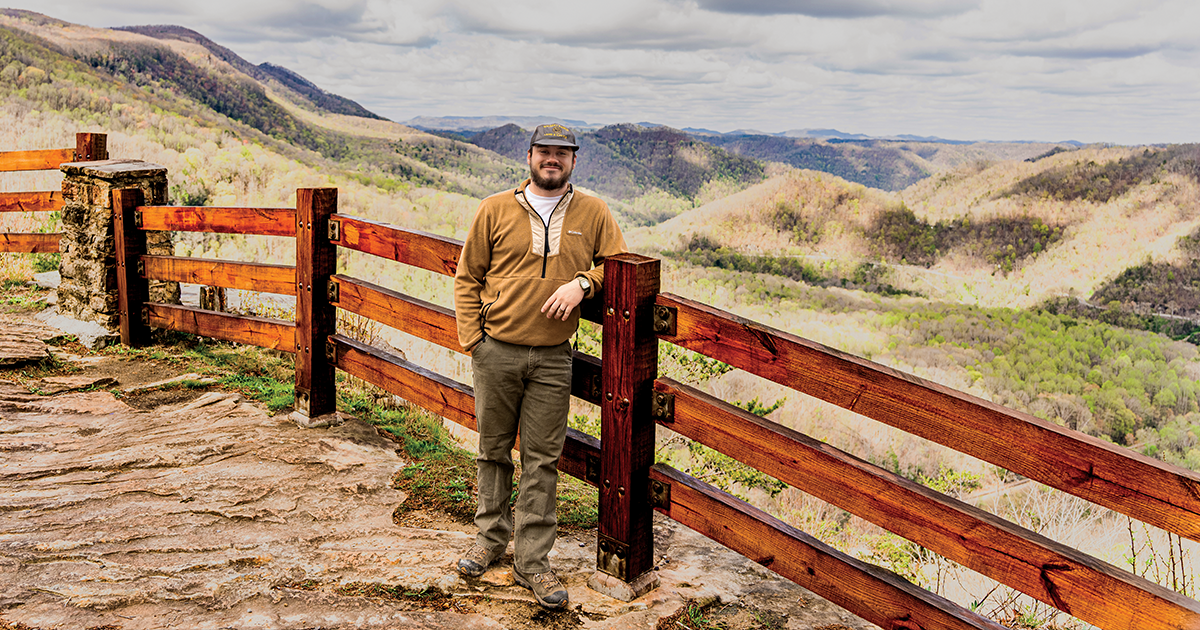
4 minute read
Tracking the Buzz
By KATIE RAY ’24
CLICK HERE to hear from Daniel Flores
Bumblebees play an essential role in agriculture and ecosystems, yet their behavior in different environments remains a topic of ongoing study.
University of Pikeville biology major Daniel Flores has taken on the challenge of understanding how these vital pollinators interact with their surroundings.
Under the mentorship of Assistant Professor of Biology Byron Meade ’14, Flores has conducted cutting-edge research into bumblebee foraging patterns, utilizing innovative tracking technology to gain new insights.
“Bees are critical to our ecosystems and are often underappreciated,” said Flores. “My goal is to understand them better and contribute to their preservation.”
Made possible through funding from the Kentucky Horticulture Council, Flores’ latest study involved attaching tiny radio-frequency microchips to 300 bumblebees, tracking their movement in different environments to determine which conditions foster the most productive pollination.
This research has been strengthened by collaborations with AppleAtcha Orchards, a development project in Eastern Kentucky that will be a vertically integrated apple facility, and Griffith Family Farm, a family-owned and operated working farm, butcher shop, farm market and restaurant in Paintsville, Ky. AppleAtcha worked with him to ensure that farming practices and pollinator research could coexist, while Griffith Family Farm provided land for his experiments.
Flores’ method is quick but effective, typically taking about 30 minutes from start to finish. It is a process that provides crucial data without disrupting the bee’s natural behavior for long. He first captures the bees using a net, then temporarily immobilizes them on ice. This allows him to carefully attach a microchip, which acts as a tiny “backpack” that records each bee’s entries and exits from the hive. With more than six weeks of data collection, his research recorded thousands of movement events, providing a detailed picture of bumblebee behavior across different landscapes.
“Tagging bees allows us to study their movements and interactions with the plants in the garden,” said Flores. “It’s a small but powerful step in understanding how bees contribute to the ecosystem and what we can do to support them.”
His data shows that tomato farms had the highest rate of bumblebee activity, suggesting that controlled environments may be more favorable for pollination efficiency than orchards or wild habitats. His findings could influence how farmers approach crop pollination, highlighting the potential for enhancing natural habitats rather than solely relying on commercial pollinators.
Originally from Texas, Flores spent time working in landscaping before pursuing biology at UPIKE. His love for the environment and public lands has fueled his drive to understand pollinators and their ecosystems.
“Bees are incredible creatures, and we’ve been connected to them for thousands of years,” said Flores. “They’ve shaped agriculture, culture and even mythology. Studying them isn’t just about science but understanding our relationship with the natural world.”
Flores has presented his research at the Kentucky Academy of Sciences and plans to share his findings at upcoming conferences. His long-term goal is to work in national parks or conservation programs, using science to protect and restore ecosystems. Looking ahead, Flores hopes to expand his research and apply his knowledge to conservation efforts. He encourages other students to follow their scientific passions, even if they take unexpected paths.
“You don’t have to be a traditional academic to do impactful research,” said Flores.
Flores’ passion for entomology and ecology has taken him beyond the hills of Eastern Kentucky. This past summer, he participated in research at the Missouri Botanical Gardens, studying how insect diversity and abundance impact crop quality in urban orchards. By analyzing more than 1,000 collected insects, he uncovered intriguing results about how different pollinators affect fruit production, particularly in city environments.
“Urban and rural ecosystems interact with pollinators in unique ways,” said Flores. “In rural areas, more insects often mean larger fruit yields, but in urban settings, diversity can sometimes lead to lower abundance. Understanding these patterns helps us develop better conservation and agricultural strategies.”
As Flores moves into his senior year, his work continues to inspire both his peers and the greater scientific community. Flores also plays a crucial role in the mushroom and hydroponic research at the university. Whether in the lab, the field or guiding tours at Breaks Interstate Park, he is dedicated to understanding and protecting the natural world.
“Daniel is the kind of student every researcher dreams of,” said Meade. “When there’s a problem, he doesn’t panic. He either finds a way or he makes one. That’s the mindset that pushes science forward.”
If you’re curious, hardworking, and open to new experiences, you can contribute to something bigger than yourself.










